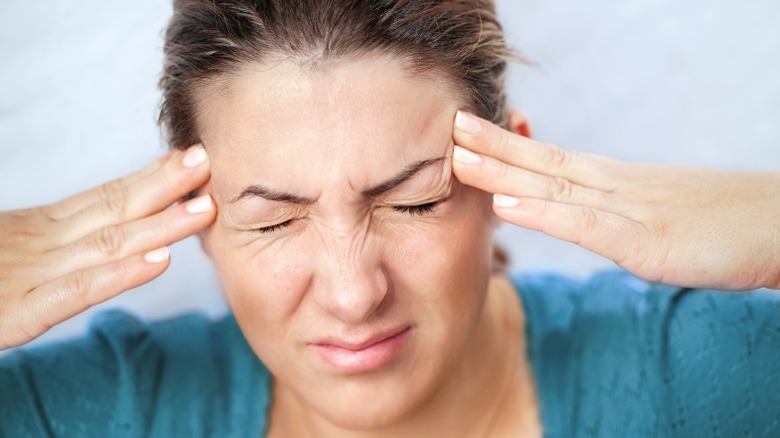What Really Happens To Your Body When You Feel Stressed Out
Being stressed out is the worst, and none of us are strangers to stress. Between work, family, bills, and other commitments, the stressors in our lives just seem to pile up continuously. It's no wonder that adults report higher levels of stress each year, according to a 2015 study by the American Psychological Association, with an estimated one-third of participants saying they were more stressed than the year before. And all that stress is just not good for us. In that same study, 24 percent of adults reported extreme stress in their lives, and a whopping 78 percent of adults reported suffering from at least one symptom of stress that year alone.
We spoke with a few experts to find out just how all that stress can affect our bodies, and some of their answers may surprise you.
Memory problems
If you've been noticing you're a lot more forgetful lately, your stress levels may be to blame. "Stress absolutely affects memory. In order for memories to be stored, material needs to be rehearsed, figuratively, in a person's mind," said Dr. Jennifer Guttman, clinical psychologist and behaviorist. "When a person is stressed, two things happen. First, they're often affected by lack of sleep and/or poor nutrition, both of which are necessary for the brain to work optimally. And secondly, during times of stress, the brain is preoccupied by whatever is causing the stress, taking up precious mental energy that would normally be used towards needed memory storage."
Moodiness
Have you been a little bit more irritable than usual? If you notice it takes less than it should to send you over the edge, it may be a result of feeling stressed out in your life. "Mentally, stress can cause our 'fuse' to become shorter, so we may lash out," said Dr. Gary Kracoff, a naturopathic doctor, registered pharmacist, and expert on stress management and relaxation at Johnson Compounding & Wellness. "Road rage is a good example of this. The changes in our blood sugar can cause irritability and poor concentration."
Too much stress can have other mood-related effects on your body, too. "Frequent periods of stress can actually cause the hippocampus to shrink over time, decreasing the amount of gray matter in the brain and even reducing the amount of dopamine in the bloodstream, potentially leading to depression," said Neema Moraveji, PhD, co-founder and chief scientist at Spire.
Obesity
If you've been trying to lose weight but just can't make the scale budge, it might be time to take a look at your stress levels. "When stress is chronic, cortisol levels stay high. When cortisol levels stay high, blood sugar stays high as well. This elevated blood sugar leads to belly fat and an inability to get rid of that belly fat no matter how much you diet or exercise," said Dr. Pete Sulack, founder of StressRX.
Diabetes
Dr. Sulack also warns that too much stress can eventually lead to diabetes, which affected over 29 million Americans in 2012 and is the seventh leading cause of death in this country.
He explained that chronic stress "leads to insulin resistance where the cells don't hear the messages from the pancreas to allow insulin inside to lower blood sugar levels. When this continues, you can be in danger of developing metabolic syndrome (high blood sugar, high blood pressure, obesity, and insulin and leptin resistance), or even full-blown type 2 diabetes. People with chronic stress often have cravings for sugar. For someone with adrenal burnout due to stress, sugar is like paper kindling; it produces a huge flame that burns up quickly."
Digestive issues
How many times have you gotten some bad news, or had a stressful day, and gotten a sick feeling at the pit of your stomach? Despite what you might have thought, that feeling isn't all in your head — there's an actual medical reason for those stomach issues and what's going on in your body.
"Digestion is greatly affected by our stress level," said Kathy Gruver, PhD. "Often a stressful time leads to problems in our gut, whether diarrhea or constipation. When truly faced with a threat our digestion slows, and meals that are further along will be expelled quickly with diarrhea and meals that aren't quite so far along will be held on to be dealt with later — constipation. Also, we don't need to be digesting food in the stomach so those enzymes and chemicals will stop working as efficiently. IBS, very much affected by stress, is just one example of how our digestion is one system affected by our stress levels."
Insomnia
There's no question that stress keeps us awake at night, and Kathy Gruver, PhD, agrees that it's an issue. "Sleep is affected by stress, not so much from a chemical perspective (though often after a threat passes, one falls into a deep sleep to let all the chemicals return to normal), but because we ruminate about what is stressing us out. It seems that as the body stills the mind goes crazy, dwelling on the past or worrying about the future." She added that sometimes the easiest solutions to these problems aren't necessarily the best: "Many people turn to chemical sleep aids, but it's really the thinking that needs to change. Affirmations, visualization, and meditation are great solutions to this stress-induced issue."
Chronic fatigue
There's being tired, and then there's being tired. The latter is what it feels like to have chronic fatigue syndrome, a common symptom of frequent stress. That fight or flight feeling brought on by stress is there to help us through trying times, but after a while, it takes a toll and just plain wears us out. The more stressed out you are, the more tired you'll feel.
Headaches
Your body's physical response to stress can often lead to pain, according to Kathy Gruver, PhD. "Headaches can be a side effect of stress in that we often experience muscle tension during this stressful time," she explained. "Whether it's clinching the jaw or pulling our shoulders up to our ears, the body responds in a very physiological way. In my experience if you wake up with a headache, it's usually caused by jaw tension from clenching or grinding the teeth during the night." Basically, if you want to ditch those headaches for good, you're going to have to let some other things go first.
Immune deficiencies
If you've been getting sick more often than usual, your snotty kids or that germ-covered shopping cart might not totally be to blame. "During a stressful situation we have a momentary boost in our immune system, but after long-term stress the immune system just becomes exhausted and can't handle things anymore," said Gruver. "Commonly people work, work, work feeling fine and then end up getting sick the first day of their vacation. It's not usually food poisoning or that person sneezing next to you on the plane. It's the fact that your immune system just can't take it anymore and finally throws in the towel."
Hair loss
If you value those pretty tresses, take some extra steps to chill out a bit — or they might start disappearing. "Believe it or not, hair can be a very sensitive barometer of someone's health. Even small changes in different lifestyle factors, including nutrition, hormone levels, sleep cycles, medications, and of course stress, can wreak havoc on your hair," said Dr. Alan Bauman, board-certified hair restoration physician. "The old saying has always been that stress will 'make you go gray,' but many are surprised to learn that it can also cause you to lose your hair. Thankfully, though, stress alone doesn't cause permanent hair loss. In most cases, it leads to a temporary hair loss situation called telogen effluvium or excessive shedding and thinning. Additionally, when stress does play a key role in hair loss, it's usually a more extreme circumstance or severe chronic stress."
Lowered sex drive
If things have cooled down between the sheets, too much stress may be to blame, according to Dr. Gary Kracoff, a naturopathic doctor, registered pharmacist and expert on stress management and relaxation at Johnson Compounding & Wellness. "Our libido and sexual function go down as our stress levels rise," he said. This is probably a secondary side effect caused by mood swings and other symptoms brought on by stress.
Aging skin
Women jump through about a million hoops to make themselves look younger than they are, so it might be downright alarming to find out that stress makes you look older, but it does. "Stress breaks down collagen in the body. Collagen is the elastic part of your skin that gives it a firm, healthy, youthful look," said Dr. Pete Sulack, founder of StressRX. "When cortisol is high, it leads to oxidation — basically a 'rusting' process of the cells that makes them age and die faster."
Breakouts
That breakout on your face might be more than just hormones. "The adrenal gland promotes oil production, which leads to clogged pores. In acne-prone individuals, stress stimulates the adrenal glands. If you are experiencing a breakout, it may be due to recent increased stress in your life," said licensed aesthetican Alissa Chasen. Her message is simple: clear your mind to get clearer skin.
Stress addiction
Stress is something we usually try to avoid, so how is it possible that we can get addicted to it? Dr. Friedemann Schaub, MD, PhD, and author of The Fear and Anxiety Solution, says it's entirely possible.
"As cells adapt to the constant stimulation caused by chronic stress, fear, and anxiety, they change their dietary habits. They become so used to being activated and fueled by stress hormones that they may crave these neurotransmitters after we've reverted to a calm and relaxed state of mind," he said. "If you think it's impossible for the body to become addicted to its own hormones and their effects, consider self-proclaimed 'stress junkies' — those people who love living on the edge and thrive on such activities as race-car driving, bungee jumping, rock climbing, and then 'relax' with a few hours of special ops video gaming. These people often say they need adrenaline rushes to feel alive. If we can develop a physical addiction to drugs, such as alcohol, nicotine, and pain medication, or to the neurotransmitters that are released by thrill-seeking and running, why shouldn't it be possible for us to also become addicted to stress?"
He added that while there is no scientific proof of this theory, it has not been thoroughly investigated to his knowledge.
Ditch the stress
Now that you know all the dangers of stress to your body and mind, take a step back and work to reduce the amount of it in your life. Easier said than done, right? While it's true that everyone probably has a different method of reducing stress and keeping calm. Dr. Gary Kracoff has a simple solution that may work for many. "As one stress reliever, I often counsel people to find an activity that brings them pure pleasure, and do it every day for 30 minutes, no matter what." he said. That sounds like a great place to start.















